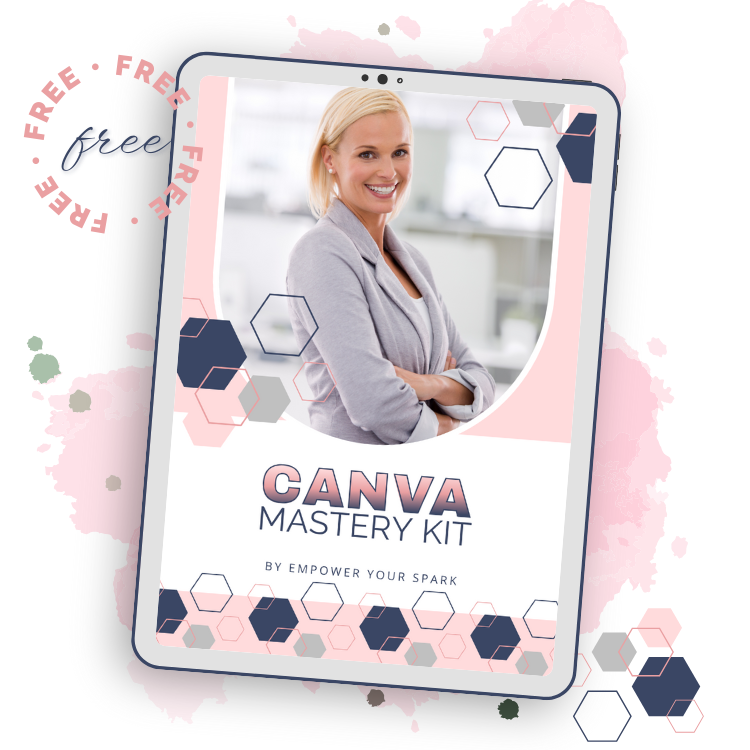Simplified Strategies & Support For
female entrepreneurs
~ Create, Grow & Thrive with Confidence ~
Hey there! You might find some affiliate links in this blog. If you decide to make a purchase through one, I may earn a small commission. It helps keep this space running, and I only share things I personally find valuable. Thanks for being here!
Blog Posts

Overcoming Self-Doubt: The Psychology, The Triggers, and The Solutions
Have you ever felt like you're not good enough, despite evidence of your skills and accomplishments? That nagging inner voice that questions your abilities and holds you back? That’s self-doubt, and it’s something almost everyone experiences at some point.
Self-doubt can stem from childhood experiences, societal pressures, or even our brain’s natural tendencies. But the good news? It doesn’t have to control you. In this article, we’ll break down the psychology behind self-doubt—why it happens, where it comes from, and, most importantly, how to break free from its grip.
By the end, you’ll walk away with practical, science-backed strategies to silence self-doubt and step into a more confident, empowered version of yourself. Let’s dive in!
What Is Self-Doubt? Understanding the Basics
Definition of self-doubt:
A psychological state of uncertainty about one’s abilities, decisions, or self-worth.
Self-doubt is that lingering inner uncertainty that makes you question whether you’re good enough, capable enough, or making the right decisions. It can stem from past experiences, societal pressures, or even our own perfectionist tendencies. While a certain level of self-questioning is natural, when it becomes excessive, it can hold us back from taking action and reaching our full potential.
How self-doubt manifests:
Negative self-talk, procrastination, avoidance, and anxiety.
Self-doubt doesn’t always look the same—it can show up in different ways depending on the situation. For some, it’s a constant stream of negative self-talk (“I’ll never be good at this”), while for others, it leads to procrastination or avoidance because of fear of failure. It can also trigger anxiety, making even simple decisions feel overwhelming, ultimately keeping us stuck in a cycle of hesitation and self-criticism.
The difference between healthy vs. paralyzing self-doubt:
When doubt is useful versus when it becomes an obstacle.
Not all self-doubt is bad—healthy self-doubt encourages self-reflection, helping us evaluate decisions carefully and strive for improvement. However, paralyzing self-doubt is when these thoughts become so overwhelming that they prevent us from moving forward. The key is learning to recognize when doubt is a useful check-in and when it’s simply fear disguising itself as logic.

The Psychology Behind Self-Doubt: Why Do We Experience It?
Evolutionary origins:
How self-doubt was once a survival mechanism.
The role of early experiences:
Childhood influences, parental expectations, and past failures.
Imposter syndrome and social comparison:
Why we feel like frauds even when we’re capable.
Cognitive distortions and negative thought patterns:
How our brains trick us into self-doubt.
Self-doubt isn’t just something we develop randomly—it’s deeply wired into human psychology. From an evolutionary standpoint, questioning ourselves helped us avoid danger. But in today’s world, it often works against us. Childhood experiences play a huge role; if we were constantly criticized or held to high expectations, we might develop a habit of doubting our abilities.
Another major factor? Imposter syndrome—that feeling that you’re secretly not good enough and that others will find out. Social comparison fuels this, especially in the age of social media, where we constantly see highlight reels of other people’s successes. Lastly, cognitive distortions (like seeing things in extremes or expecting the worst) reinforce self-doubt by amplifying our inner critic more than necessary.

The Consequences of Self-Doubt: How It Holds You Back
Analysis paralysis and procrastination:
When self-doubt takes over, it can lead to overthinking and indecision, making even small choices feel overwhelming. This hesitation often results in procrastination, where we put off tasks because we fear making mistakes or not meeting expectations. Instead of taking action, we get stuck in a loop of “what-ifs,” preventing progress and reinforcing the cycle of doubt.
Low self-esteem and lack of confidence:
Constantly questioning your abilities can slowly chip away at your self-esteem, making you feel inadequate even when you’re fully capable. When you don’t trust yourself, you’re less likely to take on challenges or pursue opportunities that could lead to growth. Over time, this lack of confidence reinforces feelings of unworthiness, making it even harder to break free from self-doubt.
Missed opportunities:
Self-doubt makes it easy to play it safe—turning down promotions, avoiding new projects, or hesitating to put yourself out there. The fear of failure, judgment, or embarrassment keeps you within familiar boundaries, even when stepping outside of them could lead to personal and professional growth. Unfortunately, staying in the comfort zone often means missing out on experiences, success, and self-discovery.
Mental health impact:
When self-doubt becomes a constant presence, it can take a serious toll on your mental and emotional well-being. Persistent negative thoughts contribute to anxiety and depression, making everyday tasks feel overwhelming and draining. The stress of feeling “never good enough” can lead to burnout, exhaustion, and a cycle of self-criticism that affects both mindset and overall quality of life.
How to Overcome Self-Doubt: Proven Strategies
Recognizing and challenging negative self-talk: Rewriting the inner narrative.
The way you talk to yourself shapes your confidence and self-image. If your inner voice constantly says, “I’m not good enough” or “I always fail,” it reinforces self-doubt and keeps you stuck. By recognizing these negative thoughts and intentionally reframing them—“I’m learning and improving” or “I am capable, even if I make mistakes”—you can start shifting your mindset toward self-belief instead of self-sabotage.
Building self-awareness: Understanding personal triggers of self-doubt.
Self-doubt often follows familiar patterns, showing up in specific situations—whether it's public speaking, making decisions, or trying something new. By paying attention to when and why doubt arises, you can start identifying your personal triggers and understand where these fears originate. The more self-aware you become, the easier it is to recognize when doubt is irrational and to take steps to overcome it.
Practicing self-compassion: Treating yourself with kindness instead of criticism.
Imagine how you’d support a friend who’s struggling—now apply that same kindness to yourself. Instead of beating yourself up for mistakes or setbacks, practice self-compassion by acknowledging your efforts and treating yourself with patience. Self-doubt thrives on harsh self-criticism, but when you replace it with encouragement, you build resilience and confidence over time.
Taking small, confident actions: Building self-trust through gradual progress.
Confidence doesn’t come from waiting until you feel “ready”—it comes from taking action, even when you have doubts. Start small by setting manageable challenges, like speaking up in a meeting or trying a new skill, and celebrate each success. Every step forward, no matter how small, reinforces the belief that you are capable, helping to weaken the grip of self-doubt.
Surrounding yourself with supportive influences: Seeking mentorship and encouragement.
The people you surround yourself with can either fuel self-doubt or empower you to grow. Seek out mentors, supportive friends, or communities that uplift you and remind you of your strengths. When you have a strong support system, you’re less likely to internalize self-doubt and more likely to take bold steps toward your goals.

Reframing Self-Doubt: Turning It into a Growth Tool
Seeing doubt as a signal for growth: Discomfort often means learning.
Feeling self-doubt doesn’t always mean something is wrong—it can actually be a sign that you’re stepping outside your comfort zone. Growth and learning often come with a sense of discomfort because you’re challenging yourself in new ways. Instead of seeing doubt as a stop sign, try reframing it as a signal that you’re on the verge of expanding your skills, knowledge, and confidence.
Embracing a growth mindset: Viewing failures as lessons rather than setbacks.
A growth mindset is the belief that abilities and intelligence can be developed through effort and learning. When you adopt this perspective, mistakes and failures are no longer proof that you’re not good enough—they’re simply part of the learning process. By shifting from “I failed” to “What can I learn from this?”, you turn self-doubt into an opportunity to grow stronger and more resilient.
Using self-doubt as motivation: Channeling it into preparation and skill-building.
Instead of letting self-doubt hold you back, use it as fuel to improve and prepare. If you doubt your ability to succeed in something, ask yourself what steps you can take to feel more confident—whether it’s learning a new skill, practicing, or seeking guidance. Doubt can be a powerful motivator when channeled into action rather than avoidance.
____
Self-doubt is NORMAL, but it doesn’t have to control your life. Understanding where it comes from and learning to challenge it can free you from its grip. By practicing self-awareness, self-compassion, and small steps of confidence-building, you can gradually silence that inner critic and step into your full potential.
The next time self-doubt whispers, “You can’t do this,” try responding, “Maybe not yet, but I’m learning.” Because growth isn’t about never doubting yourself—it’s about not letting doubt stop you.
______________
Looking for support on your online business journey?
If you’d love to connect with like-minded entrepreneurs and access valuable resources to help you grow, here are a few ways to get started:
☑️ Explore our free resources – Tools and guides designed to simplify your journey.
☑️ Join our free community – A supportive space to ask questions, share insights, and connect.
☑️ Become an Empowerment Alliance member – Get exclusive training, resources, and ongoing support.
Whatever stage you're at, you don’t have to do it alone—we’re here to help!


Overcoming Self-Doubt: The Psychology, The Triggers, and The Solutions
Have you ever felt like you're not good enough, despite evidence of your skills and accomplishments? That nagging inner voice that questions your abilities and holds you back? That’s self-doubt, and it’s something almost everyone experiences at some point.
Self-doubt can stem from childhood experiences, societal pressures, or even our brain’s natural tendencies. But the good news? It doesn’t have to control you. In this article, we’ll break down the psychology behind self-doubt—why it happens, where it comes from, and, most importantly, how to break free from its grip.
By the end, you’ll walk away with practical, science-backed strategies to silence self-doubt and step into a more confident, empowered version of yourself. Let’s dive in!
What Is Self-Doubt? Understanding the Basics
Definition of self-doubt:
A psychological state of uncertainty about one’s abilities, decisions, or self-worth.
Self-doubt is that lingering inner uncertainty that makes you question whether you’re good enough, capable enough, or making the right decisions. It can stem from past experiences, societal pressures, or even our own perfectionist tendencies. While a certain level of self-questioning is natural, when it becomes excessive, it can hold us back from taking action and reaching our full potential.
How self-doubt manifests:
Negative self-talk, procrastination, avoidance, and anxiety.
Self-doubt doesn’t always look the same—it can show up in different ways depending on the situation. For some, it’s a constant stream of negative self-talk (“I’ll never be good at this”), while for others, it leads to procrastination or avoidance because of fear of failure. It can also trigger anxiety, making even simple decisions feel overwhelming, ultimately keeping us stuck in a cycle of hesitation and self-criticism.
The difference between healthy vs. paralyzing self-doubt:
When doubt is useful versus when it becomes an obstacle.
Not all self-doubt is bad—healthy self-doubt encourages self-reflection, helping us evaluate decisions carefully and strive for improvement. However, paralyzing self-doubt is when these thoughts become so overwhelming that they prevent us from moving forward. The key is learning to recognize when doubt is a useful check-in and when it’s simply fear disguising itself as logic.

The Psychology Behind Self-Doubt: Why Do We Experience It?
Evolutionary origins:
How self-doubt was once a survival mechanism.
The role of early experiences:
Childhood influences, parental expectations, and past failures.
Imposter syndrome and social comparison:
Why we feel like frauds even when we’re capable.
Cognitive distortions and negative thought patterns:
How our brains trick us into self-doubt.
Self-doubt isn’t just something we develop randomly—it’s deeply wired into human psychology. From an evolutionary standpoint, questioning ourselves helped us avoid danger. But in today’s world, it often works against us. Childhood experiences play a huge role; if we were constantly criticized or held to high expectations, we might develop a habit of doubting our abilities.
Another major factor? Imposter syndrome—that feeling that you’re secretly not good enough and that others will find out. Social comparison fuels this, especially in the age of social media, where we constantly see highlight reels of other people’s successes. Lastly, cognitive distortions (like seeing things in extremes or expecting the worst) reinforce self-doubt by amplifying our inner critic more than necessary.

The Consequences of Self-Doubt: How It Holds You Back
Analysis paralysis and procrastination:
When self-doubt takes over, it can lead to overthinking and indecision, making even small choices feel overwhelming. This hesitation often results in procrastination, where we put off tasks because we fear making mistakes or not meeting expectations. Instead of taking action, we get stuck in a loop of “what-ifs,” preventing progress and reinforcing the cycle of doubt.
Low self-esteem and lack of confidence:
Constantly questioning your abilities can slowly chip away at your self-esteem, making you feel inadequate even when you’re fully capable. When you don’t trust yourself, you’re less likely to take on challenges or pursue opportunities that could lead to growth. Over time, this lack of confidence reinforces feelings of unworthiness, making it even harder to break free from self-doubt.
Missed opportunities:
Self-doubt makes it easy to play it safe—turning down promotions, avoiding new projects, or hesitating to put yourself out there. The fear of failure, judgment, or embarrassment keeps you within familiar boundaries, even when stepping outside of them could lead to personal and professional growth. Unfortunately, staying in the comfort zone often means missing out on experiences, success, and self-discovery.
Mental health impact:
When self-doubt becomes a constant presence, it can take a serious toll on your mental and emotional well-being. Persistent negative thoughts contribute to anxiety and depression, making everyday tasks feel overwhelming and draining. The stress of feeling “never good enough” can lead to burnout, exhaustion, and a cycle of self-criticism that affects both mindset and overall quality of life.
How to Overcome Self-Doubt: Proven Strategies
Recognizing and challenging negative self-talk: Rewriting the inner narrative.
The way you talk to yourself shapes your confidence and self-image. If your inner voice constantly says, “I’m not good enough” or “I always fail,” it reinforces self-doubt and keeps you stuck. By recognizing these negative thoughts and intentionally reframing them—“I’m learning and improving” or “I am capable, even if I make mistakes”—you can start shifting your mindset toward self-belief instead of self-sabotage.
Building self-awareness: Understanding personal triggers of self-doubt.
Self-doubt often follows familiar patterns, showing up in specific situations—whether it's public speaking, making decisions, or trying something new. By paying attention to when and why doubt arises, you can start identifying your personal triggers and understand where these fears originate. The more self-aware you become, the easier it is to recognize when doubt is irrational and to take steps to overcome it.
Practicing self-compassion: Treating yourself with kindness instead of criticism.
Imagine how you’d support a friend who’s struggling—now apply that same kindness to yourself. Instead of beating yourself up for mistakes or setbacks, practice self-compassion by acknowledging your efforts and treating yourself with patience. Self-doubt thrives on harsh self-criticism, but when you replace it with encouragement, you build resilience and confidence over time.
Taking small, confident actions: Building self-trust through gradual progress.
Confidence doesn’t come from waiting until you feel “ready”—it comes from taking action, even when you have doubts. Start small by setting manageable challenges, like speaking up in a meeting or trying a new skill, and celebrate each success. Every step forward, no matter how small, reinforces the belief that you are capable, helping to weaken the grip of self-doubt.
Surrounding yourself with supportive influences: Seeking mentorship and encouragement.
The people you surround yourself with can either fuel self-doubt or empower you to grow. Seek out mentors, supportive friends, or communities that uplift you and remind you of your strengths. When you have a strong support system, you’re less likely to internalize self-doubt and more likely to take bold steps toward your goals.

Reframing Self-Doubt: Turning It into a Growth Tool
Seeing doubt as a signal for growth: Discomfort often means learning.
Feeling self-doubt doesn’t always mean something is wrong—it can actually be a sign that you’re stepping outside your comfort zone. Growth and learning often come with a sense of discomfort because you’re challenging yourself in new ways. Instead of seeing doubt as a stop sign, try reframing it as a signal that you’re on the verge of expanding your skills, knowledge, and confidence.
Embracing a growth mindset: Viewing failures as lessons rather than setbacks.
A growth mindset is the belief that abilities and intelligence can be developed through effort and learning. When you adopt this perspective, mistakes and failures are no longer proof that you’re not good enough—they’re simply part of the learning process. By shifting from “I failed” to “What can I learn from this?”, you turn self-doubt into an opportunity to grow stronger and more resilient.
Using self-doubt as motivation: Channeling it into preparation and skill-building.
Instead of letting self-doubt hold you back, use it as fuel to improve and prepare. If you doubt your ability to succeed in something, ask yourself what steps you can take to feel more confident—whether it’s learning a new skill, practicing, or seeking guidance. Doubt can be a powerful motivator when channeled into action rather than avoidance.
____
Self-doubt is NORMAL, but it doesn’t have to control your life. Understanding where it comes from and learning to challenge it can free you from its grip. By practicing self-awareness, self-compassion, and small steps of confidence-building, you can gradually silence that inner critic and step into your full potential.
The next time self-doubt whispers, “You can’t do this,” try responding, “Maybe not yet, but I’m learning.” Because growth isn’t about never doubting yourself—it’s about not letting doubt stop you.
______________
Looking for support on your online business journey?
If you’d love to connect with like-minded entrepreneurs and access valuable resources to help you grow, here are a few ways to get started:
☑️ Explore our free resources – Tools and guides designed to simplify your journey.
☑️ Join our free community – A supportive space to ask questions, share insights, and connect.
☑️ Become an Empowerment Alliance member – Get exclusive training, resources, and ongoing support.
Whatever stage you're at, you don’t have to do it alone—we’re here to help!

Follow Us!
Get your FREE Canva Mastery Kit
A quick reference guide for Canva


FREE DOWNLOAD
Canva Mastery Kit
A Canva resource guide
Effortless Design Mastery: Discover time-saving shortcuts and techniques for polished Canva design
Professional Design Insights: Unlock tips for better Canva creations
Build Design Confidence: Gain skills for effortless creation
Empower Your Spark © 2025. All Rights Reserved.





